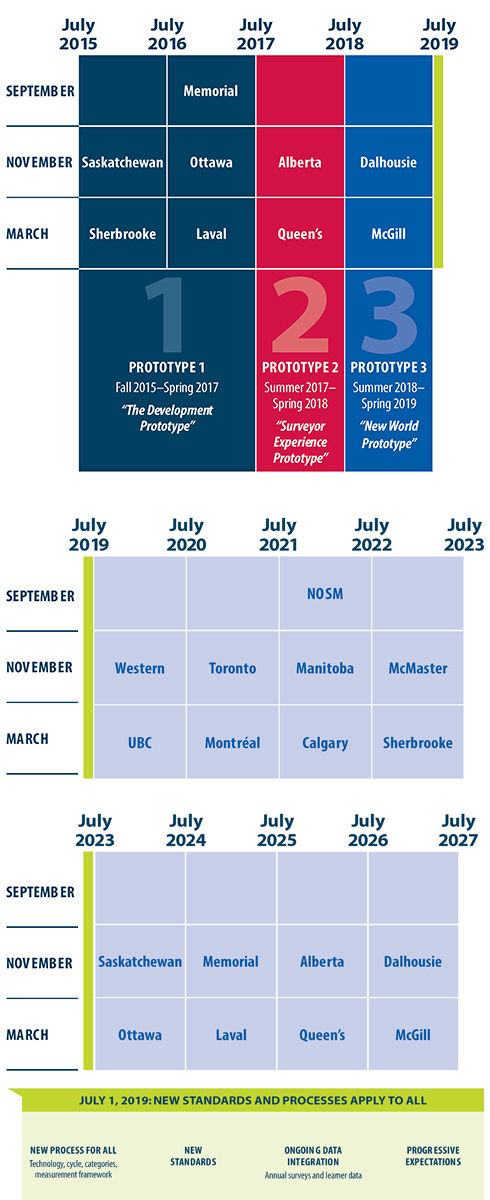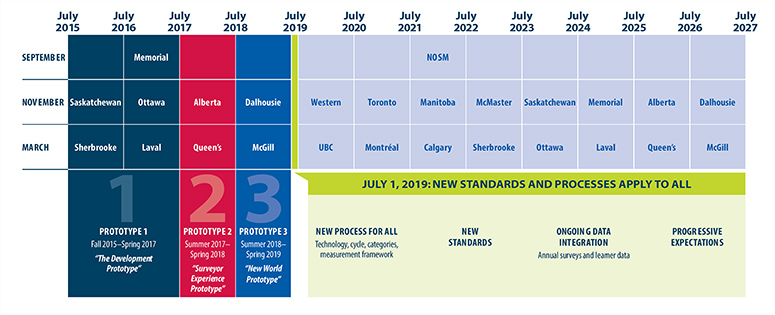Timeline for Accreditation Reform
The implementation of CanERA includes a multi-phased approach of prototype testing prior to full implementation, which is planned for July 1, 2019. It is important to note that prior to July 1, 2019, the new system of accreditation, CanERA, will be applicable only to the regular accreditation reviews of the two Prototype 3 Universities (i.e., Dalhousie University and McGill University); as such, prior to July 1, 2019, CanERA will not be applicable to any other accreditation reviews (i.e. mandated internal reviews, external reviews, progress reports) or applications. As of July 1, 2019, CanERA will be applicable to all universities and their residency programs.
Accreditation reform by university


Transitioning to a new accreditation system is complex. Rest assured, all schools and residency programs, as well as others involved in the residency accreditation process (e.g. surveyors, specialty committee members, accreditation committee members), will have the time they need to prepare for the proposed changes and will be provided with tools and training to assist in the transition. Visit our training, tools, and support page for more information.
Prototype Testing Phases
Prototype 1 (Fall 2015 - Spring 2017): The Development Prototype [Complete]
Focus of the evaluation:
- Standards content and proposed evidence sources
- Needs assessment to inform:
- Onsite accreditation review process
- Development of training, tools and support for the transition to CanERA
- Identification of opportunities for potential tracers (themes to trace throughout an accreditation review)
How the evaluation was conducted:
Prototype 1 was conducted by a small number of CanRAC staff and peer-review volunteers during the regular accreditation review of five universities; however, this did not have an impact on the accreditation of those institutions and residency programs identified in Prototype 1; the accreditation review for Prototype 1 institutions and residency programs was status quo (i.e., CanERA was not applied to the accreditation review and decision making process).
Prototype 2 (Summer 2017 - Spring 2018): The Surveyor Experience Prototype [Complete]
Focus of the evaluation:
- Surveyor experience with respect to:
- Use of CanAMS
- Standards and associated evidence sources
- Decision-making (recommendation) process (e.g., categories of accreditation, rating of requirements, decision-making principles and support tools)
- Needs assessment to inform:
- Onsite accreditation review process
- Development of training, tools and support for the transition to CanERA
- Collection of baseline data
How the evaluation was conducted:
To provide input on the above noted objectives, including testing of the CanAMS, a team of “shadow” surveyors accompanied the regular accreditation review team assigned to Prototype 2 Universities; however, this team of shadow surveyors was given explicit instructions not to influence the regular accreditation review (e.g. they were not allowed to ask questions during the onsite interviews and evening meetings were held separate from that of the regular accreditation review team).
Prototype 3 (Summer 2018 - Spring 2019): The CanERA Prototype [Ongoing]
Focus of the evaluation:
- Testing of all aspects of CanERA (i.e. new standards, new process, CanAMS, data integration) as they apply to all involved in the accreditation process
- Collection of baseline data (e.g. time spent preparing for accreditation review)
How the evaluation will be conducted:
- All aspects of the regular accreditation review of Dalhousie University and McGill University will be conducted based on CanERA.
Full Implementation (July 2019 onwards)
CanERA will apply to all residency program and institutions being reviewed July 1, 2019 and onwards. Prototype testing and ongoing evaluation will continue to inform the further development and continuous improvement of CanERA.

